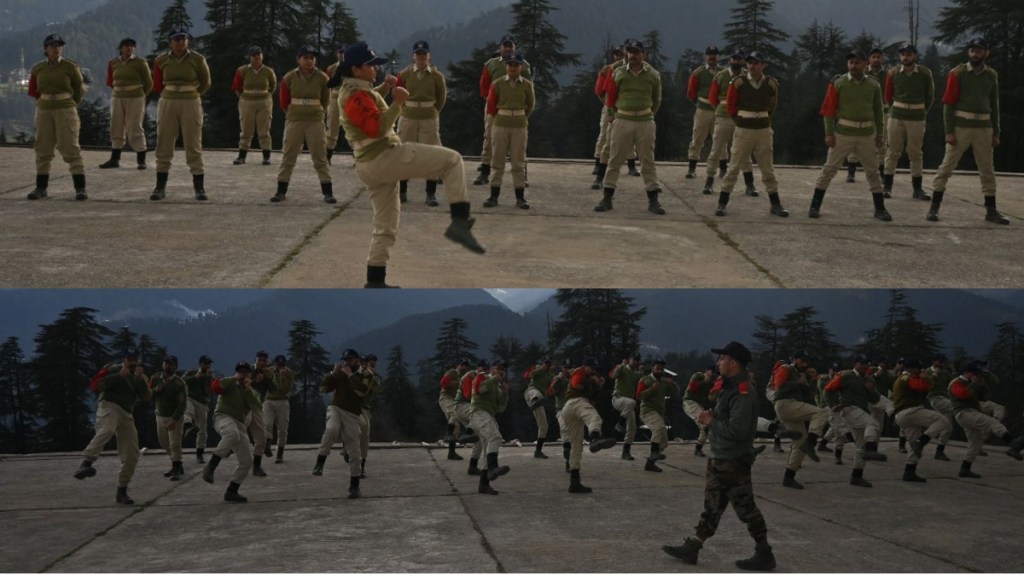Amid discussions regarding the potential removal of the Armed Forces Special Power Act (AFSPA) from Jammu and Kashmir, the Indian Army has initiated training sessions for the police in anti-terrorism operations. Currently, 62 Deputy Superintendents of Police (DSPs) and 1000 sub-inspectors of the Jammu and Kashmir Police are participating in a specialized training program at the White Knight Corps Battle School in Bhalra, Doda, commencing on March 19, 2024.
Notably, a significant number of women in both ranks are also actively engaged in the training sessions. The primary objective of this program is to bolster coordination and operational capabilities between the Indian Army and the Jammu & Kashmir Police.
For more than three decades, these institutions have collaborated closely in the fight against terrorism. Notable operations such as the successful strikes in Pulwama and strategic containment efforts in Sopore stand as testament to their effective partnership. These joint endeavors have not only disrupted terrorist activities but have also played a pivotal role in restoring law and order, ultimately fostering peace and stability in the region.
According to informed sources, the training curriculum emphasizes operational tactics, intelligence sharing, and counter-terrorism strategies, drawing from the extensive experience of the Indian Army in these domains. This concerted effort aims to equip the Jammu & Kashmir Police with enhanced skills and expertise to effectively address security challenges in the region, while also facilitating smoother coordination between the two forces.
-

Glimpses of Training. (Image: Indian Army)
-

Glimpses of Training. (Image: Indian Army)
-

Glimpses of Training. (Image: Indian Army)
It signifies progress towards a future where the alignment of the Indian Army and Jammu & Kashmir Police plays a crucial role in maintaining peace and safety in Jammu and Kashmir. The bravery and sacrifices of both forces have been crucial in upholding national security. The synergy achieved during training will contribute to restoring peace and normalcy in the Union Territory of Jammu & Kashmir, while also empowering the Jammu and Kashmir Police as a more capable and well-trained force. This integrated training program is expected to strengthen the partnership between the Indian Army and Jammu & Kashmir Police, leading to more effective counter-terrorism operations in the future.
Background
Law and order had deteriorated badly in Jammu and Kashmir since the last years of the 80s. Along with the terrorist organizations operating from Pakistan, local tanzeems (terrorist groups) also became active. In such a situation, command was given to the army to restore peace in the state. For this, a special Armed Forces Special Power Act (AFSPA) was implemented in the state. Under this law the army was legally strengthened. The result was that the army, along with the CRPF and police, almost eliminated terrorism.
After the Pulwama attack, the army along with the police ‘cracked down’ the terrorists. Terrorism was controlled in a strategic manner in Sopore. In such a situation, when peace has been restored in the state after the removal of Article 370, Home Minister Amit Shah had recently said that AFSPA will be removed from the state soon. This is the reason why the Army has now started preparing Jammu and Kashmir Police for a new and important role. Why? So that in the coming time, Jammu and Kashmir Police can completely take command of the anti-terrorist operation in its hands.
Operation All Out is going on continuously by the Army to eliminate terrorism from Jammu and Kashmir and the success of this operation can be judged only by the fact that almost all the top commanders of the terrorists present in the valley have been killed in the encounter. The situation has reached such a stage that terrorist organizations are now afraid of appointing anyone as commander.
There is a huge difference in the training of Army and Police and with the aim of reducing this difference, Indian Army and Jammu and Kashmir Police are training together. The special thing is that for the last three decades, the security forces, which have been dealing with the same enemy in their own way, have now started thinking in the same way for the first time and the result of that is joint training.





